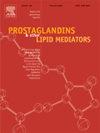An updated systematic review and meta-analysis of pomegranate consumption on lipid profile
IF 2.5
3区 生物学
Q3 BIOCHEMISTRY & MOLECULAR BIOLOGY
Prostaglandins & other lipid mediators
Pub Date : 2025-04-09
DOI:10.1016/j.prostaglandins.2025.106992
引用次数: 0
Abstract
Pomegranate, rich in bioactive compounds such as polyphenols and flavonoids, has been studied for its potential lipid-modulating effects, yet evidence remains inconsistent. This systematic review and meta-analysis aimed to evaluate the impact of pomegranate consumption on plasma lipid profiles by synthesizing data from randomized controlled trials (RCTs). Following PRISMA guidelines, 37 RCTs (n = 2695 participants) were included after searching Scopus and MEDLINE databases. Studies assessed pomegranate products (juice, extract, seed oil) administered orally for ≥ 7 days, with lipid parameters, including total cholesterol (TC), low-density lipoprotein cholesterol (LDL-C), high-density lipoprotein cholesterol (HDL-C), triglycerides (TG) as outcomes. Data were pooled using RevMan 5.3 with random-effects models. Results indicated that pomegranate intake significantly increased HDL-C levels (mean difference: 2.50 mg/dL, 95 % CI: 1.00–4.00, p < 0.05), while no significant changes were observed in TC, LDL-C, or TG. Subgroup analyses revealed pronounced HDL-C elevation in non-alcoholic fatty liver disease (NAFLD) patients, health participants and interventions lasting ≥ 8 weeks. Heterogeneity across studies was attributed to variations in intervention duration, dosage forms, and participant characteristics. Publication bias was nonsignificant (Egger’s test, p > 0.05). These findings suggest that pomegranate supplementation may improve HDL-C, potentially through modulation of HDL-associated enzymes like paraoxonase. However, further large-scale, long-term RCTs are warranted to confirm these effects and explore synergistic benefits with standard lipid-lowering therapies.
最新的系统综述和荟萃分析石榴消费对血脂的影响
石榴富含生物活性化合物,如多酚和类黄酮,已被研究其潜在的脂质调节作用,但证据仍不一致。本系统综述和荟萃分析旨在通过综合随机对照试验(rct)的数据来评估石榴消费对血脂谱的影响。按照PRISMA指南,检索Scopus和MEDLINE数据库后纳入37项rct (n = 2695名受试者)。研究评估了口服石榴产品(果汁、提取物、籽油)≥ 7天,脂质参数包括总胆固醇(TC)、低密度脂蛋白胆固醇(LDL-C)、高密度脂蛋白胆固醇(HDL-C)、甘油三酯(TG)作为结局。采用RevMan 5.3随机效应模型对数据进行汇总。结果表明,石榴摄入量显著增加HDL-C水平(平均差异:2.50 mg/dL, 95 % CI: 1.00-4.00, p <; 0.05),而TC、LDL-C和TG没有显著变化。亚组分析显示,在非酒精性脂肪性肝病(NAFLD)患者、健康参与者和持续≥ 8周的干预措施中,HDL-C明显升高。研究的异质性归因于干预时间、剂型和参与者特征的差异。发表偏倚无显著性(Egger检验,p >; 0.05)。这些发现表明,石榴补充剂可能通过调节hdl相关酶(如对氧磷酶)来改善HDL-C。然而,需要进一步的大规模、长期随机对照试验来证实这些效果,并探索与标准降脂疗法的协同效益。
本文章由计算机程序翻译,如有差异,请以英文原文为准。
求助全文
约1分钟内获得全文
求助全文
来源期刊

Prostaglandins & other lipid mediators
生物-生化与分子生物学
CiteScore
5.80
自引率
3.40%
发文量
49
审稿时长
2 months
期刊介绍:
Prostaglandins & Other Lipid Mediators is the original and foremost journal dealing with prostaglandins and related lipid mediator substances. It includes basic and clinical studies related to the pharmacology, physiology, pathology and biochemistry of lipid mediators.
Prostaglandins & Other Lipid Mediators invites reports of original research, mini-reviews, reviews, and methods articles in the basic and clinical aspects of all areas of lipid mediator research: cell biology, developmental biology, genetics, molecular biology, chemistry, biochemistry, physiology, pharmacology, endocrinology, biology, the medical sciences, and epidemiology.
Prostaglandins & Other Lipid Mediators also accepts proposals for special issue topics. The Editors will make every effort to advise authors of the decision on the submitted manuscript within 3-4 weeks of receipt.
 求助内容:
求助内容: 应助结果提醒方式:
应助结果提醒方式:


